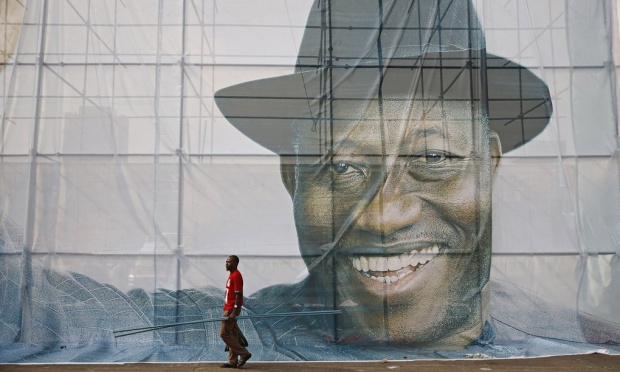Breaking News
“Nigeria’s Rulers Cannot Be Allowed To Believe They Can Get Away With Stealing Another Election” The Guardian

By Remi Adekoya written for The Guardian
Free and fair elections distinguish true democracies from those merely masquerading. Though nominally democratic since the end of military rule in 1999, Nigeria has yet to hold a presidential election free of ballot-rigging, voter intimidation and other decidedly undemocratic practices. The ruling PDP party has ensured victory for itself, by hook or by crook, in every single Nigerian presidential election conducted since 1999.
Relentlessly optimistic, Nigerians had hoped this year’s presidential polls, scheduled for 14 February, would be different. This time, we would get it right. Nigeria, recently declared Africa’s biggest economy, would prove that its democracy was developing.
For a while, reality was benevolent. For the first time since 1999, opposition parties united behind a single presidential candidate, Muhammadu Buhari, a former military ruler. This levelled the playing field.
After weeks of spirited campaigning by both candidates, a January poll showed Buhari and the current president, Goodluck Jonathan, running neck and neck. The election was declared too close to call.
Nigerians usually know the winner of a presidential election months before voting day, so this was a refreshing change. This was real democracy.
Then, on Saturday, Nigeria’s electoral commission (INEC) announced that, while it was “substantially ready” to conduct elections on 14 February, it felt compelled to postpone voting for six weeks (until 28 March). This was because the country’s military “could not guarantee security for the election”.
Attahiru Jega, head of the INEC, said Nigeria’s service chiefs had told him they needed to concentrate on military operations meant to defeat the dreaded Islamist Boko Haram group within six weeks, and would thus “be unable to provide their traditional support” during a February election.
The military, which now claims it will do in six weeks what it has been unable to do in six years, thus forced the electoral commission’s hand, triggering the postponement.
In response, the opposition APC party called the development a major setback for Nigerian democracy, and a highly provocative decision.
Given the extensive media coverage of Boko Haram’s increasingly brazen attacks in north-eastern Nigeria, international observers could well see reason for the postponement. After all, a reported 1.5 million people have been displaced by the violence. They would probably have been unable to vote in February.
Holding an election in the middle of an insurgency is not ideal, but it would not be a novelty either. Despite its own share of insecurity, Afghanistan managed to conduct a credible presidential election last year. So did war-torn Ukraine. Even Isis-infested Iraq organised parliamentary polls in 2014.
So either the generals are once again calling the shots in Nigeria or they are following the instructions of Jonathan, their commander-in-chief. Both options give cause for concern.
The opposition is not alone in its scepticism of the official reasons for the postponement. Social media was abuzz with Nigerians criticising the decision. Some consider it a ploy by Jonathan to buy time in a campaign he seemed to be on the verge of losing.
Although an Afrobarometer poll suggested the election was too close to call, Buhari seemed to have greater momentum in recent weeks. The retired general was drawing large crowds and picking up high-profile endorsements. Even a former PDP president, Olusegun Obasanjo, refused to support Jonathan, saying his party colleague had “failed” as president. The army’s timing of its latest Boko Haram offensive seems suspiciously convenient for Jonathan.
Some fear his next move will be to go after Jega, the electoral chief, and replace him with someone more pliant. Key Jonathan allies are already calling for Jega’s removal, saying he is in cahoots with the opposition.
Experience tells me Nigeria’s ruling party will try to use the extra time to guarantee Jonathan’s victory by any means necessary: bribery, intimidation and outright rigging. I hope I am wrong.
While resistance to any attempt at undermining Nigeria’s democracy must be driven from within, the international community also has a role to play. Foreign media, governments, NGOs and everyone else interested in Nigeria’s progress need to watch Jonathan’s next moves closely and apply maximum pressure on him and his allies to conduct credible polls.
Nigeria’s rulers cannot be allowed to believe they can get away with stealing another election. The consequences of that could be disastrous. Jonathan’s apparent determination to cling on to power at all costs risks plunging Africa’s most populous nation into a political crisis that could fast spiral out of control.
Yes, Boko Haram must be battled, because they represent a deadly threat to Nigeria’s stability. Unfortunately, Jonathan and his ruling party might well prove to be an even deadlier one.







Nwokedi Nworisara
2015/02/08 at 7:12 pm
So your newspaper has taken sides already. It is a big shame for such a newspaper to give the impression that democracy is better served only when the incumbent is unfairly pushed out of power in a civilian coup as the opposition and the deceived international community are made to believe. What is at stake is not who wins but who can keep Nigeria united and one country. That is the very bases of progress. Who can give her another chance to be. What we face is a group of international conspirators and oil interests plus religious extremists who would rather split Nigeria than allow her to reach her manifest destiny. They are hiding under all sorts of guises and are working together to send the country into a war much worse than Boko Haram. Peace has no alternative. We are able to talk about corruption because we have peace. We are able to hope because Nigeria is. When Nigeria splits and we become an international theater of war then various interests will come to the fore and even your newspaper will write another editorial saying you never knew it was like this. I do not pray it turns out this like that !